SWP4LHE Assessment 2: Analyzing Access to Justice in Victoria
VerifiedAdded on 2023/06/10
|7
|1572
|172
Report
AI Summary
This report provides a reflection and analysis of court proceedings in Victoria, Australia, focusing on issues of access to justice for vulnerable groups as identified in the Law Council of Victoria’s Justice Project Report. It examines a specific case involving a disabled juvenile charged with sexual assault, highlighting potential systemic flaws and service gaps within the legal system. The analysis considers relevant legislation such as the Disability Services Act, 1986 and the Juvenile Justice Act, 1992, questioning whether adequate provisions exist to safeguard the rights and well-being of individuals with disabilities within the justice system. The report concludes by recommending improvements to legislation and practices to ensure fair and equitable access to justice for all members of society.
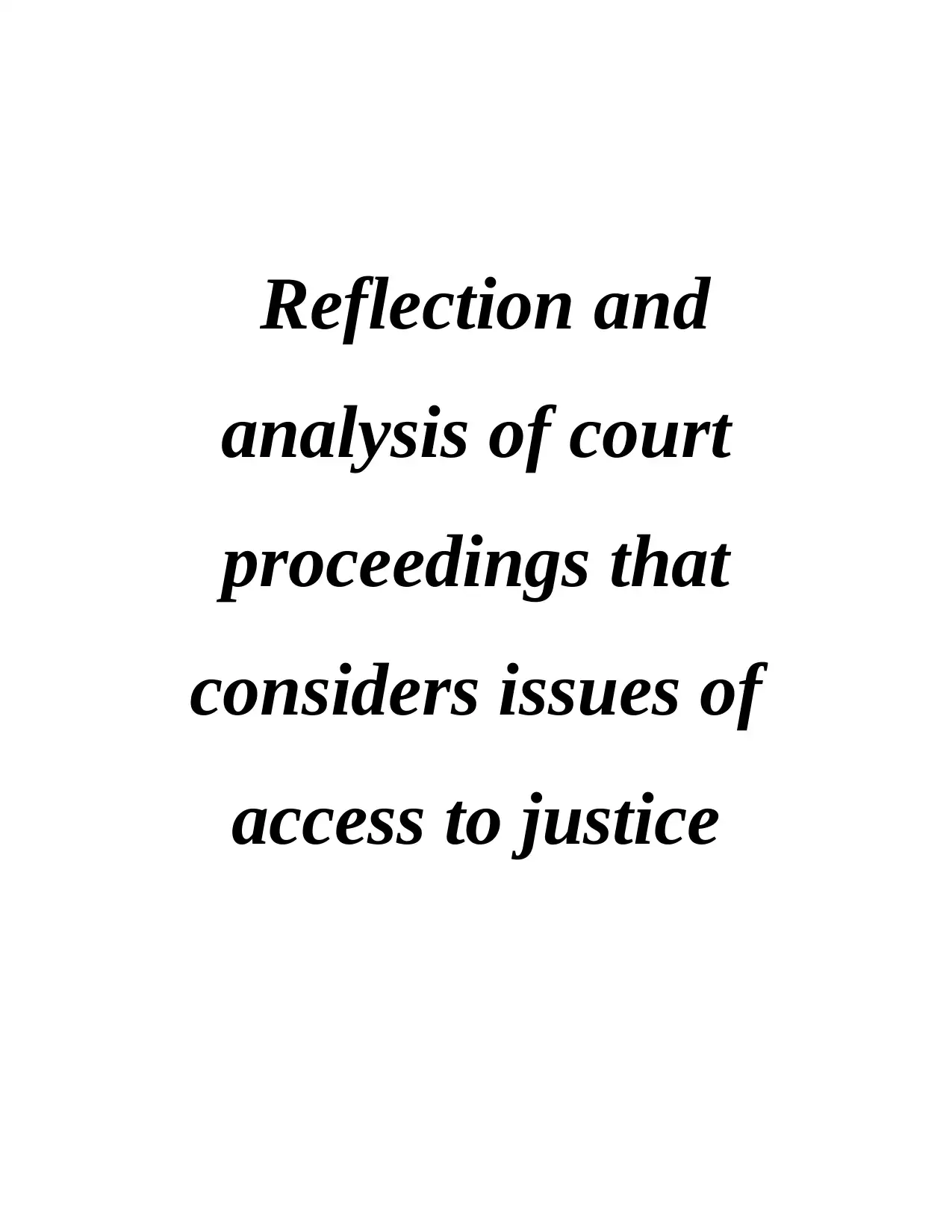
Reflection and
analysis of court
proceedings that
considers issues of
access to justice
analysis of court
proceedings that
considers issues of
access to justice
Paraphrase This Document
Need a fresh take? Get an instant paraphrase of this document with our AI Paraphraser
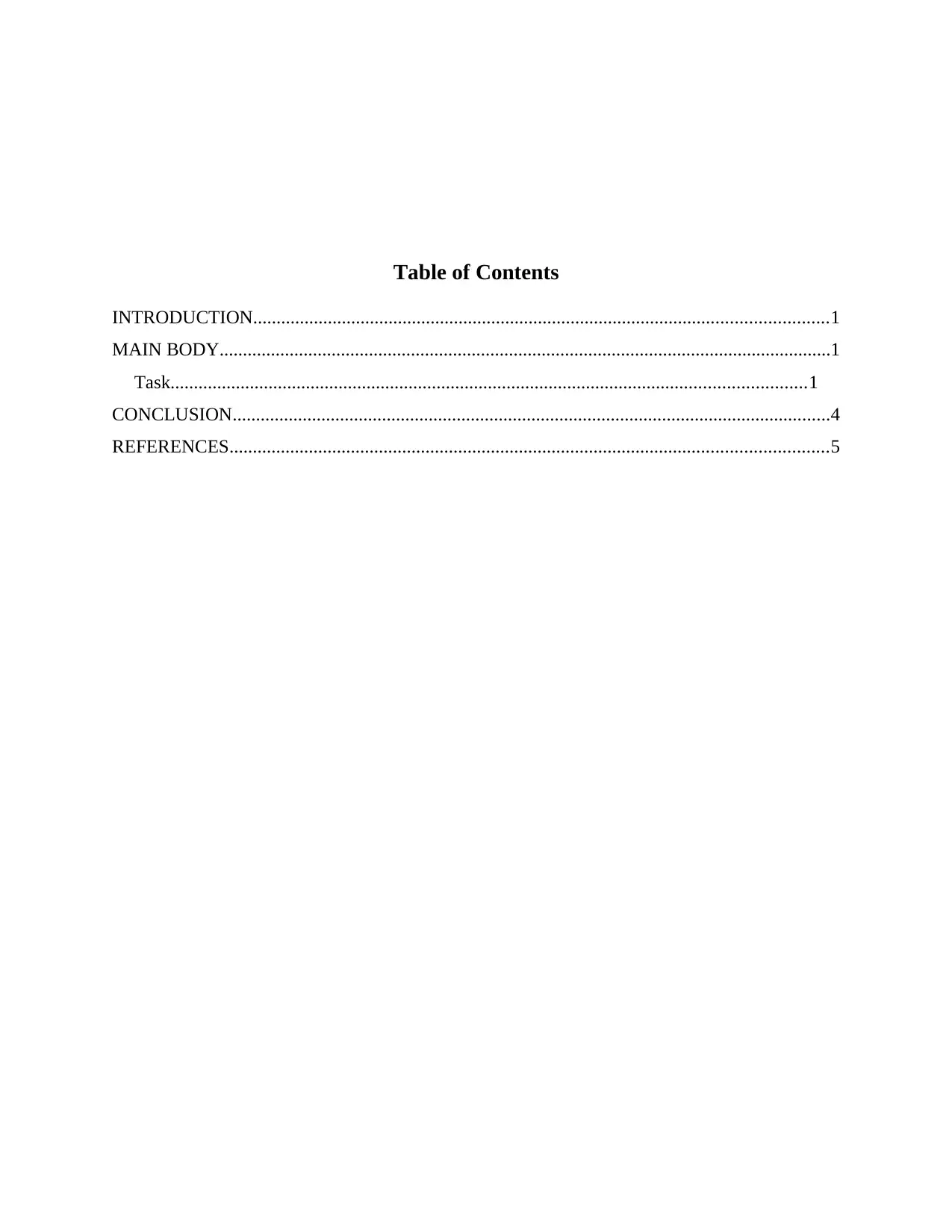
Table of Contents
INTRODUCTION...........................................................................................................................1
MAIN BODY...................................................................................................................................1
Task........................................................................................................................................1
CONCLUSION................................................................................................................................4
REFERENCES................................................................................................................................5
INTRODUCTION...........................................................................................................................1
MAIN BODY...................................................................................................................................1
Task........................................................................................................................................1
CONCLUSION................................................................................................................................4
REFERENCES................................................................................................................................5
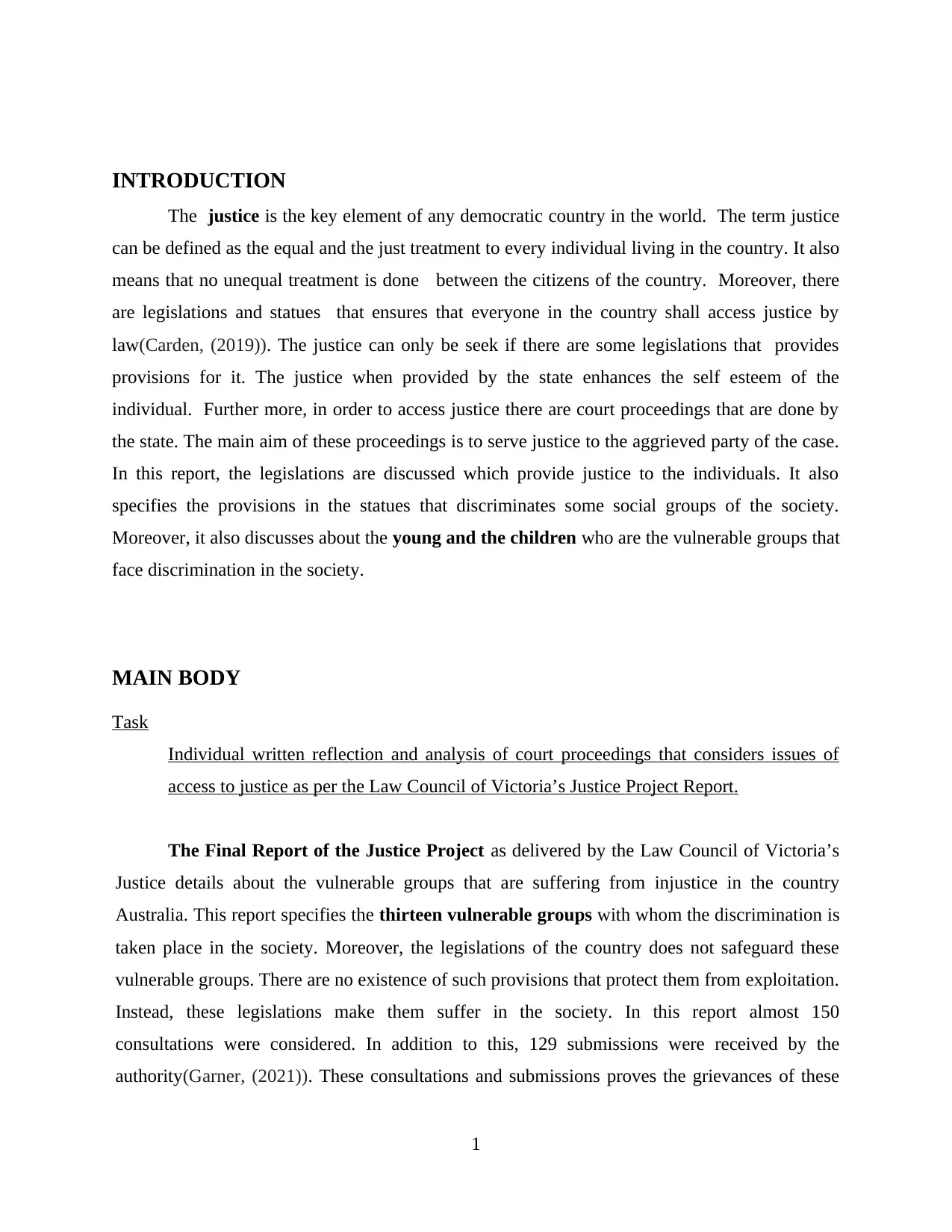
INTRODUCTION
The justice is the key element of any democratic country in the world. The term justice
can be defined as the equal and the just treatment to every individual living in the country. It also
means that no unequal treatment is done between the citizens of the country. Moreover, there
are legislations and statues that ensures that everyone in the country shall access justice by
law(Carden, (2019)). The justice can only be seek if there are some legislations that provides
provisions for it. The justice when provided by the state enhances the self esteem of the
individual. Further more, in order to access justice there are court proceedings that are done by
the state. The main aim of these proceedings is to serve justice to the aggrieved party of the case.
In this report, the legislations are discussed which provide justice to the individuals. It also
specifies the provisions in the statues that discriminates some social groups of the society.
Moreover, it also discusses about the young and the children who are the vulnerable groups that
face discrimination in the society.
MAIN BODY
Task
Individual written reflection and analysis of court proceedings that considers issues of
access to justice as per the Law Council of Victoria’s Justice Project Report.
The Final Report of the Justice Project as delivered by the Law Council of Victoria’s
Justice details about the vulnerable groups that are suffering from injustice in the country
Australia. This report specifies the thirteen vulnerable groups with whom the discrimination is
taken place in the society. Moreover, the legislations of the country does not safeguard these
vulnerable groups. There are no existence of such provisions that protect them from exploitation.
Instead, these legislations make them suffer in the society. In this report almost 150
consultations were considered. In addition to this, 129 submissions were received by the
authority(Garner, (2021)). These consultations and submissions proves the grievances of these
1
The justice is the key element of any democratic country in the world. The term justice
can be defined as the equal and the just treatment to every individual living in the country. It also
means that no unequal treatment is done between the citizens of the country. Moreover, there
are legislations and statues that ensures that everyone in the country shall access justice by
law(Carden, (2019)). The justice can only be seek if there are some legislations that provides
provisions for it. The justice when provided by the state enhances the self esteem of the
individual. Further more, in order to access justice there are court proceedings that are done by
the state. The main aim of these proceedings is to serve justice to the aggrieved party of the case.
In this report, the legislations are discussed which provide justice to the individuals. It also
specifies the provisions in the statues that discriminates some social groups of the society.
Moreover, it also discusses about the young and the children who are the vulnerable groups that
face discrimination in the society.
MAIN BODY
Task
Individual written reflection and analysis of court proceedings that considers issues of
access to justice as per the Law Council of Victoria’s Justice Project Report.
The Final Report of the Justice Project as delivered by the Law Council of Victoria’s
Justice details about the vulnerable groups that are suffering from injustice in the country
Australia. This report specifies the thirteen vulnerable groups with whom the discrimination is
taken place in the society. Moreover, the legislations of the country does not safeguard these
vulnerable groups. There are no existence of such provisions that protect them from exploitation.
Instead, these legislations make them suffer in the society. In this report almost 150
consultations were considered. In addition to this, 129 submissions were received by the
authority(Garner, (2021)). These consultations and submissions proves the grievances of these
1
⊘ This is a preview!⊘
Do you want full access?
Subscribe today to unlock all pages.

Trusted by 1+ million students worldwide
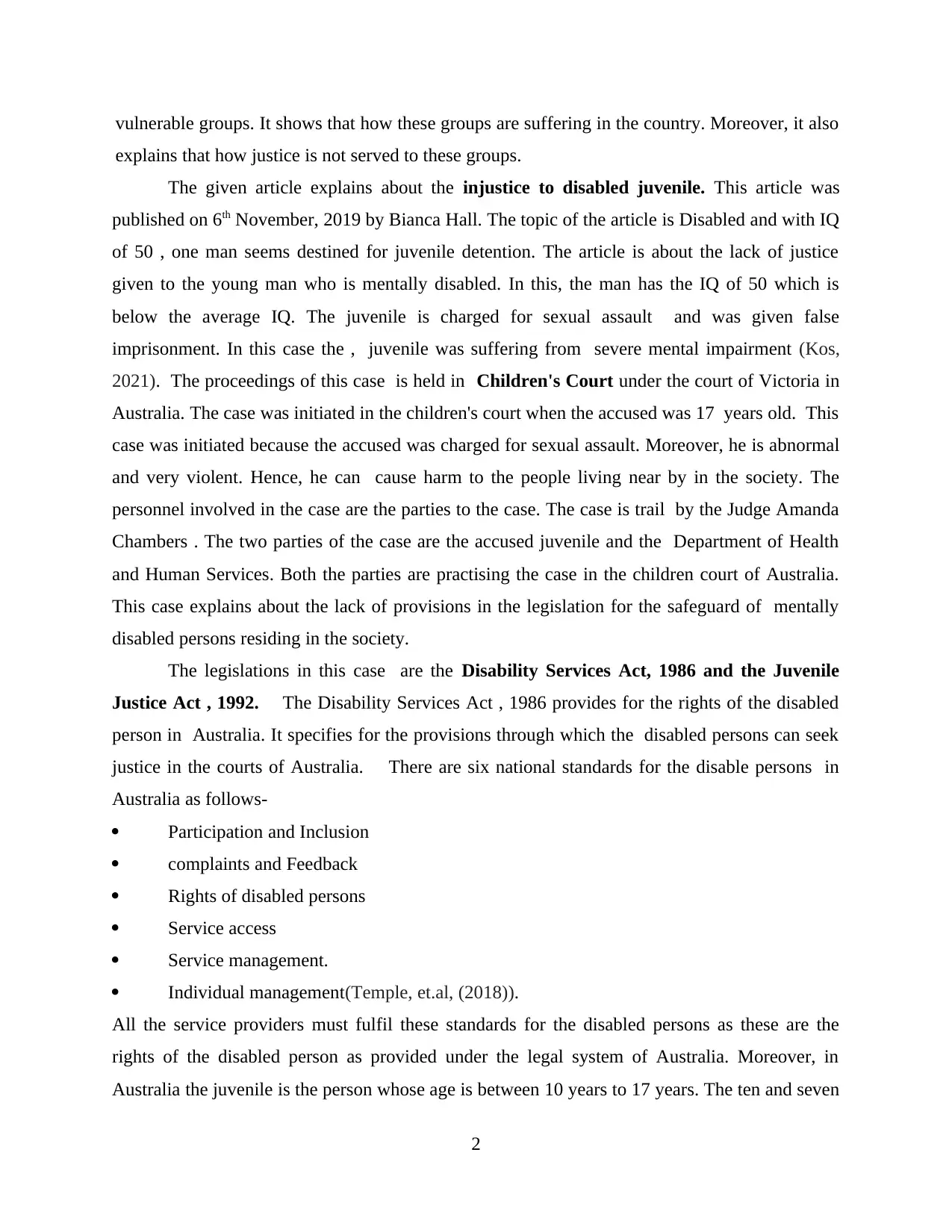
vulnerable groups. It shows that how these groups are suffering in the country. Moreover, it also
explains that how justice is not served to these groups.
The given article explains about the injustice to disabled juvenile. This article was
published on 6th November, 2019 by Bianca Hall. The topic of the article is Disabled and with IQ
of 50 , one man seems destined for juvenile detention. The article is about the lack of justice
given to the young man who is mentally disabled. In this, the man has the IQ of 50 which is
below the average IQ. The juvenile is charged for sexual assault and was given false
imprisonment. In this case the , juvenile was suffering from severe mental impairment (Kos,
2021). The proceedings of this case is held in Children's Court under the court of Victoria in
Australia. The case was initiated in the children's court when the accused was 17 years old. This
case was initiated because the accused was charged for sexual assault. Moreover, he is abnormal
and very violent. Hence, he can cause harm to the people living near by in the society. The
personnel involved in the case are the parties to the case. The case is trail by the Judge Amanda
Chambers . The two parties of the case are the accused juvenile and the Department of Health
and Human Services. Both the parties are practising the case in the children court of Australia.
This case explains about the lack of provisions in the legislation for the safeguard of mentally
disabled persons residing in the society.
The legislations in this case are the Disability Services Act, 1986 and the Juvenile
Justice Act , 1992. The Disability Services Act , 1986 provides for the rights of the disabled
person in Australia. It specifies for the provisions through which the disabled persons can seek
justice in the courts of Australia. There are six national standards for the disable persons in
Australia as follows-
Participation and Inclusion
complaints and Feedback
Rights of disabled persons
Service access
Service management.
Individual management(Temple, et.al, (2018)).
All the service providers must fulfil these standards for the disabled persons as these are the
rights of the disabled person as provided under the legal system of Australia. Moreover, in
Australia the juvenile is the person whose age is between 10 years to 17 years. The ten and seven
2
explains that how justice is not served to these groups.
The given article explains about the injustice to disabled juvenile. This article was
published on 6th November, 2019 by Bianca Hall. The topic of the article is Disabled and with IQ
of 50 , one man seems destined for juvenile detention. The article is about the lack of justice
given to the young man who is mentally disabled. In this, the man has the IQ of 50 which is
below the average IQ. The juvenile is charged for sexual assault and was given false
imprisonment. In this case the , juvenile was suffering from severe mental impairment (Kos,
2021). The proceedings of this case is held in Children's Court under the court of Victoria in
Australia. The case was initiated in the children's court when the accused was 17 years old. This
case was initiated because the accused was charged for sexual assault. Moreover, he is abnormal
and very violent. Hence, he can cause harm to the people living near by in the society. The
personnel involved in the case are the parties to the case. The case is trail by the Judge Amanda
Chambers . The two parties of the case are the accused juvenile and the Department of Health
and Human Services. Both the parties are practising the case in the children court of Australia.
This case explains about the lack of provisions in the legislation for the safeguard of mentally
disabled persons residing in the society.
The legislations in this case are the Disability Services Act, 1986 and the Juvenile
Justice Act , 1992. The Disability Services Act , 1986 provides for the rights of the disabled
person in Australia. It specifies for the provisions through which the disabled persons can seek
justice in the courts of Australia. There are six national standards for the disable persons in
Australia as follows-
Participation and Inclusion
complaints and Feedback
Rights of disabled persons
Service access
Service management.
Individual management(Temple, et.al, (2018)).
All the service providers must fulfil these standards for the disabled persons as these are the
rights of the disabled person as provided under the legal system of Australia. Moreover, in
Australia the juvenile is the person whose age is between 10 years to 17 years. The ten and seven
2
Paraphrase This Document
Need a fresh take? Get an instant paraphrase of this document with our AI Paraphraser
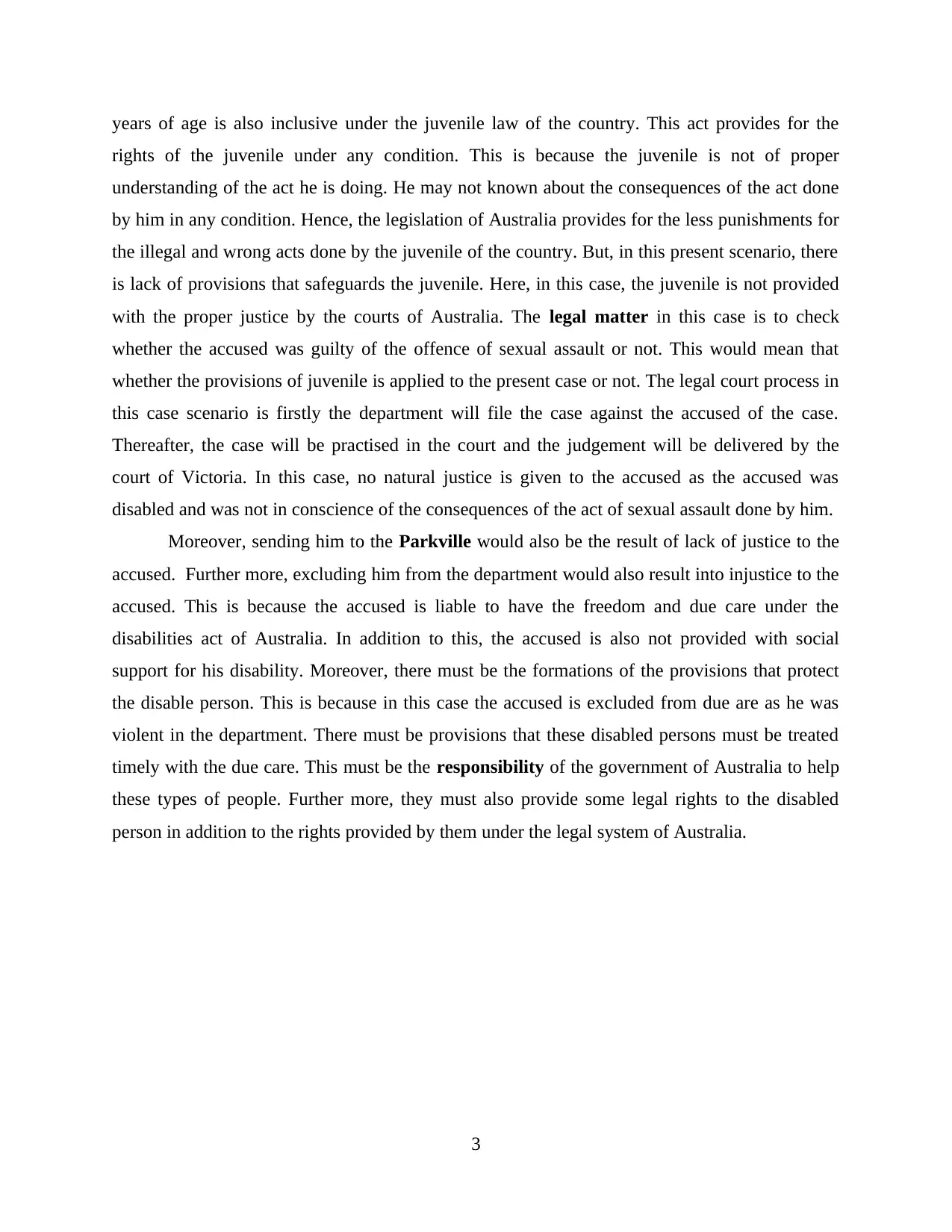
years of age is also inclusive under the juvenile law of the country. This act provides for the
rights of the juvenile under any condition. This is because the juvenile is not of proper
understanding of the act he is doing. He may not known about the consequences of the act done
by him in any condition. Hence, the legislation of Australia provides for the less punishments for
the illegal and wrong acts done by the juvenile of the country. But, in this present scenario, there
is lack of provisions that safeguards the juvenile. Here, in this case, the juvenile is not provided
with the proper justice by the courts of Australia. The legal matter in this case is to check
whether the accused was guilty of the offence of sexual assault or not. This would mean that
whether the provisions of juvenile is applied to the present case or not. The legal court process in
this case scenario is firstly the department will file the case against the accused of the case.
Thereafter, the case will be practised in the court and the judgement will be delivered by the
court of Victoria. In this case, no natural justice is given to the accused as the accused was
disabled and was not in conscience of the consequences of the act of sexual assault done by him.
Moreover, sending him to the Parkville would also be the result of lack of justice to the
accused. Further more, excluding him from the department would also result into injustice to the
accused. This is because the accused is liable to have the freedom and due care under the
disabilities act of Australia. In addition to this, the accused is also not provided with social
support for his disability. Moreover, there must be the formations of the provisions that protect
the disable person. This is because in this case the accused is excluded from due are as he was
violent in the department. There must be provisions that these disabled persons must be treated
timely with the due care. This must be the responsibility of the government of Australia to help
these types of people. Further more, they must also provide some legal rights to the disabled
person in addition to the rights provided by them under the legal system of Australia.
3
rights of the juvenile under any condition. This is because the juvenile is not of proper
understanding of the act he is doing. He may not known about the consequences of the act done
by him in any condition. Hence, the legislation of Australia provides for the less punishments for
the illegal and wrong acts done by the juvenile of the country. But, in this present scenario, there
is lack of provisions that safeguards the juvenile. Here, in this case, the juvenile is not provided
with the proper justice by the courts of Australia. The legal matter in this case is to check
whether the accused was guilty of the offence of sexual assault or not. This would mean that
whether the provisions of juvenile is applied to the present case or not. The legal court process in
this case scenario is firstly the department will file the case against the accused of the case.
Thereafter, the case will be practised in the court and the judgement will be delivered by the
court of Victoria. In this case, no natural justice is given to the accused as the accused was
disabled and was not in conscience of the consequences of the act of sexual assault done by him.
Moreover, sending him to the Parkville would also be the result of lack of justice to the
accused. Further more, excluding him from the department would also result into injustice to the
accused. This is because the accused is liable to have the freedom and due care under the
disabilities act of Australia. In addition to this, the accused is also not provided with social
support for his disability. Moreover, there must be the formations of the provisions that protect
the disable person. This is because in this case the accused is excluded from due are as he was
violent in the department. There must be provisions that these disabled persons must be treated
timely with the due care. This must be the responsibility of the government of Australia to help
these types of people. Further more, they must also provide some legal rights to the disabled
person in addition to the rights provided by them under the legal system of Australia.
3
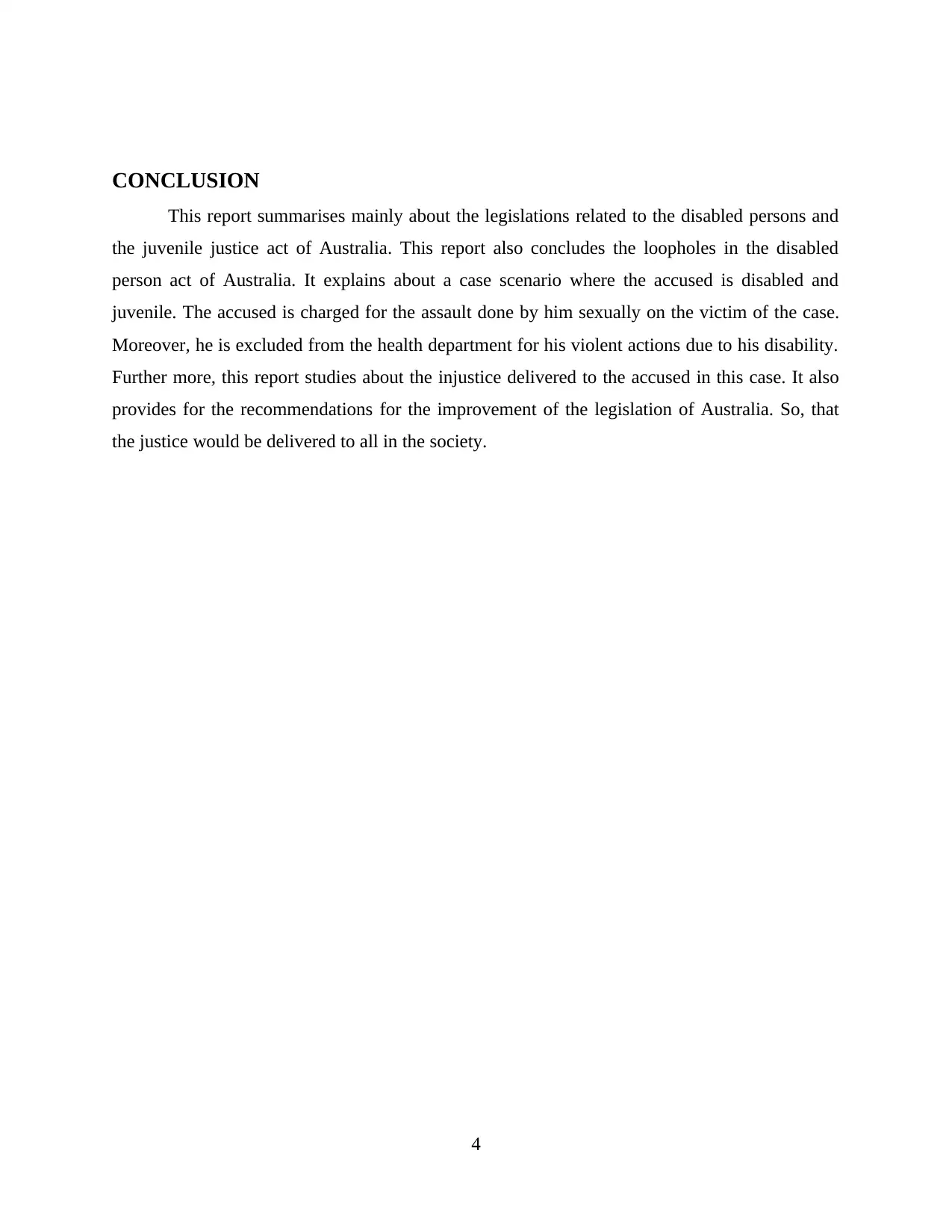
CONCLUSION
This report summarises mainly about the legislations related to the disabled persons and
the juvenile justice act of Australia. This report also concludes the loopholes in the disabled
person act of Australia. It explains about a case scenario where the accused is disabled and
juvenile. The accused is charged for the assault done by him sexually on the victim of the case.
Moreover, he is excluded from the health department for his violent actions due to his disability.
Further more, this report studies about the injustice delivered to the accused in this case. It also
provides for the recommendations for the improvement of the legislation of Australia. So, that
the justice would be delivered to all in the society.
4
This report summarises mainly about the legislations related to the disabled persons and
the juvenile justice act of Australia. This report also concludes the loopholes in the disabled
person act of Australia. It explains about a case scenario where the accused is disabled and
juvenile. The accused is charged for the assault done by him sexually on the victim of the case.
Moreover, he is excluded from the health department for his violent actions due to his disability.
Further more, this report studies about the injustice delivered to the accused in this case. It also
provides for the recommendations for the improvement of the legislation of Australia. So, that
the justice would be delivered to all in the society.
4
⊘ This is a preview!⊘
Do you want full access?
Subscribe today to unlock all pages.

Trusted by 1+ million students worldwide
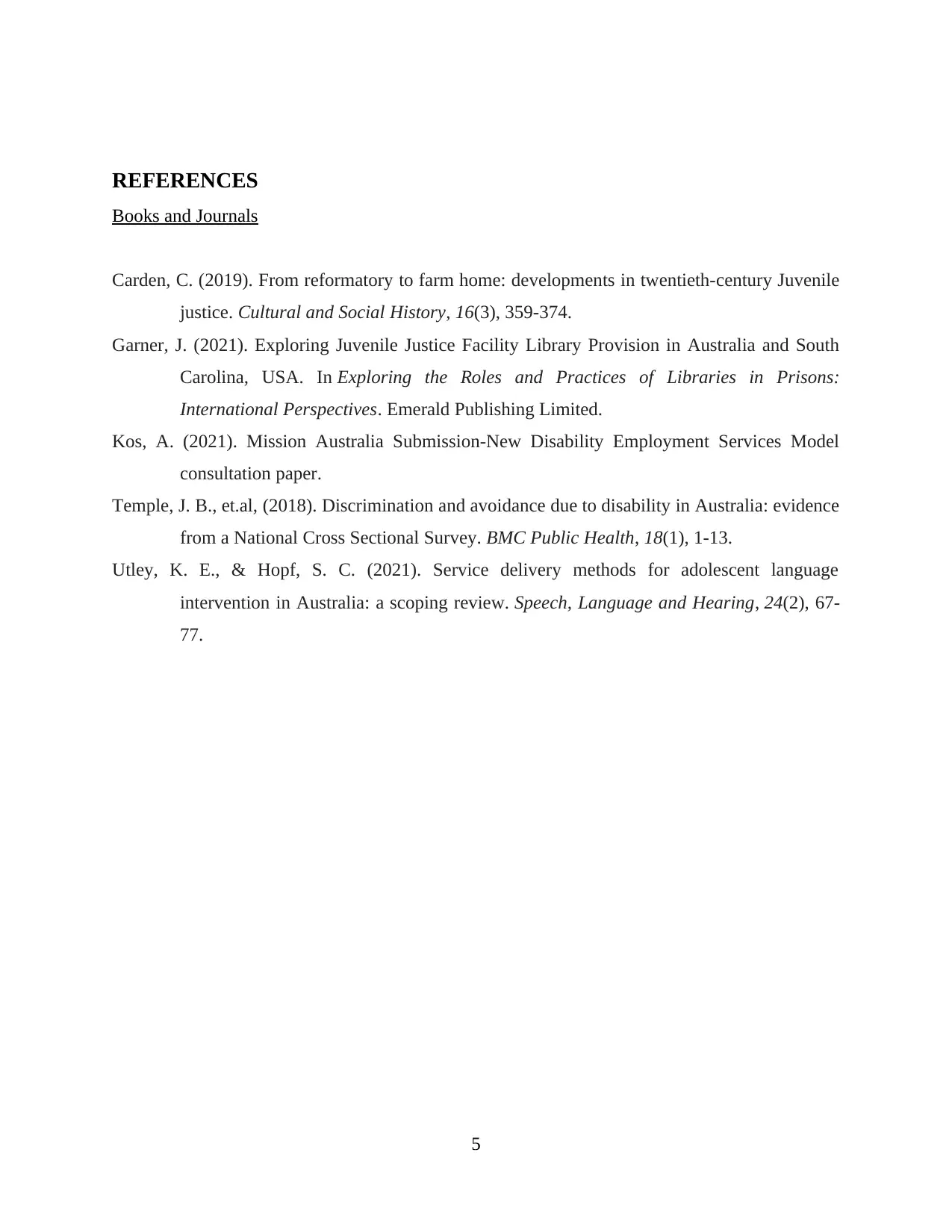
REFERENCES
Books and Journals
Carden, C. (2019). From reformatory to farm home: developments in twentieth-century Juvenile
justice. Cultural and Social History, 16(3), 359-374.
Garner, J. (2021). Exploring Juvenile Justice Facility Library Provision in Australia and South
Carolina, USA. In Exploring the Roles and Practices of Libraries in Prisons:
International Perspectives. Emerald Publishing Limited.
Kos, A. (2021). Mission Australia Submission-New Disability Employment Services Model
consultation paper.
Temple, J. B., et.al, (2018). Discrimination and avoidance due to disability in Australia: evidence
from a National Cross Sectional Survey. BMC Public Health, 18(1), 1-13.
Utley, K. E., & Hopf, S. C. (2021). Service delivery methods for adolescent language
intervention in Australia: a scoping review. Speech, Language and Hearing, 24(2), 67-
77.
5
Books and Journals
Carden, C. (2019). From reformatory to farm home: developments in twentieth-century Juvenile
justice. Cultural and Social History, 16(3), 359-374.
Garner, J. (2021). Exploring Juvenile Justice Facility Library Provision in Australia and South
Carolina, USA. In Exploring the Roles and Practices of Libraries in Prisons:
International Perspectives. Emerald Publishing Limited.
Kos, A. (2021). Mission Australia Submission-New Disability Employment Services Model
consultation paper.
Temple, J. B., et.al, (2018). Discrimination and avoidance due to disability in Australia: evidence
from a National Cross Sectional Survey. BMC Public Health, 18(1), 1-13.
Utley, K. E., & Hopf, S. C. (2021). Service delivery methods for adolescent language
intervention in Australia: a scoping review. Speech, Language and Hearing, 24(2), 67-
77.
5
1 out of 7
Your All-in-One AI-Powered Toolkit for Academic Success.
+13062052269
info@desklib.com
Available 24*7 on WhatsApp / Email
![[object Object]](/_next/static/media/star-bottom.7253800d.svg)
Unlock your academic potential
Copyright © 2020–2025 A2Z Services. All Rights Reserved. Developed and managed by ZUCOL.
